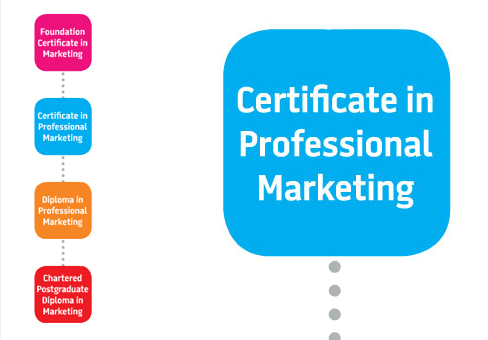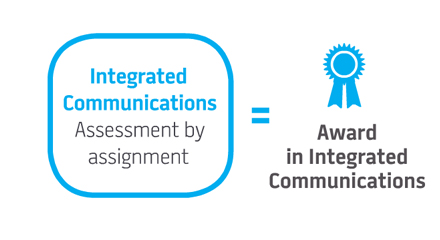Study spotlight: new CIM Certificate in Professional Marketing

 The Certificate in Professional Marketing is a key part of CIM’s professional qualifications, launched in late 2014. Here we provide an overview of the key features of the Certificate qualification compiled by Jon Twomey of Student Support Group. This is the second in a short series of articles designed to keep London members up to date. This overview is designed for both seasoned marketers and those at the start of their career.
The Certificate in Professional Marketing is a key part of CIM’s professional qualifications, launched in late 2014. Here we provide an overview of the key features of the Certificate qualification compiled by Jon Twomey of Student Support Group. This is the second in a short series of articles designed to keep London members up to date. This overview is designed for both seasoned marketers and those at the start of their career.
- For senior marketers who may have gained their own CIM qualifications some time ago, it’ll ensure you are familiar with the CIM’s new suite of qualifications so you can understand how they can help you to manage the performance and training of your team.
- For those starting out, you’ll gain an appreciation of why CIM qualifications are so well thought of, and how they can complement any business qualifications you may already have from college or university.
As well as providing this report, Student Support Group provides a free advice helpline for London studying members which you can call on 01784 463057. The group is one of CIM’s Accredited Study Centres and has supported more than 20,000 marketers to gain their professional marketing qualifications. The helpline is sponsored by the CIM Greater London Region Board.
Why are CIM qualifications so well regarded?
- Fit for purpose: CIM qualifications are based on extensive research with marketing professionals and the wider business community to ensure they match the skills and knowledge required by the marketplace. Each module is based on CIM’s unique Professional Marketing Standards designed to help marketers meet the increasing demands of them at every stage in their career.
- In demand: These qualifications have been enthusiastically received by employers, who often require CIM qualifications when they advertise marketing vacancies. These qualifications are also in demand from many leading Universities who have recently joined CIM’s Graduate Gateway (GG) scheme.
- Bite-sized chunks: CIM recognise the need of today’s busy marketer for flexible bite-sized learning and this portfolio has been created with this in mind. Each module is a self-contained award or can be combined with other awards to gain a full CIM qualification.
- Flexible: You get to choose your study dates and delivery methods for learning.
- Blend theory with practice: These qualifications underpin your degree with a practitioner focus.
- Add credibility: CIM qualifications are internationally recognised. They enhance your CV and your credibility with employers as well as providing you with the opportunity to become a Chartered Marketer
- Network: Being a CIM member enables you to engage and network with potential employers.
- Earn more: individuals with professional qualifications and membership gain £152,000 in additional earnings over their career. Professionally qualified Marketing Directors can earn in excess of £70,000 (UK’s 10 best paid jobs - January 2015)
Focus on the CIM Certificate in Professional Marketing
Who is it designed for?
The CIM Level 4 Certificate in Professional Marketing is aimed at the aspiring professional marketer who wishes to gain knowledge and skills to succeed and progress within a career in marketing.
Entry requirements
To gain entry onto this qualification you’ll need at least one of the following:
CIM Level 3 Foundation or old Intro’ Cert. in Marketing; any relevant Level 3 qualification; any UK Degree or International equivalent; International Baccalaureate (equivalent to NQF Level 3+); professional practice (suggested one year in a marketing role) and diagnostic assessment onto Level 4. Many students entering level 4 already have a degree in a subject other than Marketing.
What does it provide?
This Level 4 qualification provides the practising marketer with relevant, contemporary marketing content to equip them for the current global landscape. Learning is brought to life through meaningful and active assessment methods which embrace the modern marketing industry.
Successful completion of the CIM Level 4 Certificate in Professional Marketing will establish the knowledge, skills and understanding to be able to perform at an operational level and to carry out an essential and successful professional marketing role within the workplace.
How many modules are there?
The modules are:
- Marketing
- Integrated Communications
+ - Customer experience – or - Digital Marketing
To achieve the CIM Level 4 Certificate, you’ll need to pass BOTH mandatory modules plus ONE elective module, making three modules in total.
You can study these in any order, though Jon recommends doing Marketing first if you can, followed by Integrated Communications and then one (only) of the optional/elective modules. Each bite-sized module is an award in its own right, so you can spread out the study (and the costs) and study for one module at a time and build up to the full Certificate qualification later.

Marketing (mandatory)

 This module will give you an insight into marketing concepts and tools and how these are applied to deliver results. The module is divided into 3 sections:
This module will give you an insight into marketing concepts and tools and how these are applied to deliver results. The module is divided into 3 sections:
- 25% - The marketing concept
- 30%) - Analysis and insight
- 45% - The marketing mix
What will I learn from this module?
Learning Outcome: Upon completion of studies, module students should be able to:
- Understand the role and function of marketing
- Understand what influences customer behaviour
- Identify factors and trends in the marketing environment and how they affect marketing planning
- Identify options for gathering relevant marketing information
- Know the elements of the marketing mix
- Apply and adapt the marketing mix to satisfy customer needs
It is interesting to note the CIM command/action words typically used at Certificate level focus on skills like identifying and applying, with reference to CIM recognised theory of course.
How is the Marketing module assessed?
This module is assessed by an examination comprising 40 multiple-choice questions (worth 2 marks each) plus two case studies with 5 multiple choice questions (also worth 2 marks each), all in a two-hour controlled assessment.
Sample exam questions (select only one answer per question
Section 1
1. The start point of marketing is which of the following?
a. To develop an appropriate communications plan.
b. To build a suitable brand profile for the organisation.
c. To know who the customer is and what they need.
d. To understand who all the competitors are.
2. When attempting to drive stakeholder value marketers should focus on:
a. setting appropriate and realistic budgets for all marketing activities.
b. developing a clearly targeted and highly focused marketing mix.
c. implementing a clear marketing plan with SMART objectives.
d. improving the proposition for customers and return for shareholders.
3. By understanding customers and their needs marketing organisations should be able to achieve which of the following more easily?
a. Customer classifications.
b. Customer systems.
c. Customer satisfaction.
d. Customer resistance.
Section 2 – based on two mini-case studies
CS1.1 The board's desired approach to ensure the future success of the hotel could be described as which of the following?
a. Customer communications
b. Market segmentation
c. Marketing orientation
d. Sales effort
Integrated Communications (mandatory)
 Marketers need to communicate effectively with internal stakeholders and customers. This module will provide you with the skills to assist in developing communications to build sustainable relationships.
Marketers need to communicate effectively with internal stakeholders and customers. This module will provide you with the skills to assist in developing communications to build sustainable relationships.
This module is also divided into 3 sections:
- 25% - Internal marketing
- 35% - Value proposition
- 40% - Marketing communications
What will I learn from this module?
Learning Outcome: Upon completion of studies, module students should be able to:
- Know how to build cross-functional relationships
- Understand how to harness resources to deliver effective marketing solutions
- Create effective communications to deliver value to customers
- Understand product and brand management
- Understand the components of the marketing communications mix
- Develop integrated marketing communications
How is the Integrated Communications module assessed?
This module is assessed with a 12-page assignment based on a given scenario and an organisation of choice. The assignment consists of three tasks.
Customer experience (elective)
 Marketers increasingly need to develop deeper knowledge of customers in different contexts. This module will enable you to understand and enhance the customer experience.
Marketers increasingly need to develop deeper knowledge of customers in different contexts. This module will enable you to understand and enhance the customer experience.
This module is also divided into 3 sections:
- 30% - Customer context
- 40% - Customer experience
- 30% - Measuring and monitoring
What will I learn from this module?
Learning Outcomes: Upon completion of studies, module students should be able to:
- Understand the range of different contexts across which marketers operate
- Understand the importance of customer expectations
- Understand the different dimensions of customer experience
- Deliver activities that enhance customer experience
- Know how to monitor and measure customer experience in context
- Use metrics to improve future customer experience
How is the Customer Experience module assessed?
This module is assessed with a 12-page assignment based on a given scenario and an organisation of choice. The assignment consists of three tasks.
Digital marketing (elective)
 Digital marketing is a constantly evolving and increasingly important discipline within modern marketing. This module will enable you to build essential skills in order to identify, integrate and monitor effective digital tactics to deliver enhanced marketing activities.
Digital marketing is a constantly evolving and increasingly important discipline within modern marketing. This module will enable you to build essential skills in order to identify, integrate and monitor effective digital tactics to deliver enhanced marketing activities.
This module is also divided into 3 sections:
- 30% - The digital landscape
- 40% - Digital toolkit
- 30% - Digital in action
What will I learn from this module?
Learning Outcome: Upon completion of studies, module students should be able to:
- Understand the opportunities and challenges presented through the disruptive digital environment
- Assess the impact and influence of the dynamic digital environment
- Know how key digital tools can support and enhance marketing
- Understand the relevance of digital platforms and channels in context
- Develop digital activities to support and enhance multichannel marketing
- Apply the key principles involved in monitoring and measuring digital marketing effectiveness
How is the Digital Marketing module assessed?
This module is assessed via a three-part portfolio comprising research, plan and report.
How long will it take me to get qualified?
Each module has been calculated as carrying 15 credits which equates to around 130-150 notional learning hours.
This includes:
- tutor guided learning hours
- practical and work-based learning
- assessment preparation time
- assessment time
When are the assessments delivered?
There are three assessment sessions per year. These take place at the end of March/early April, and end of June and early December each year. For exact dates please see our Learning Zone.
What’s next after the Certificate?
Once you’re qualified you could consider the CIM/CAM Diploma in Digital Marketing which is also a level 4 qualification. This provides the essential knowledge and skills needed to plan, implement and monitor effective digital marketing campaigns and contribute to operational marketing plans.
Alternatively, you could move up to the CIM Level 6 Diploma in Professional Marketing. This provides the required knowledge, skills and understanding at management level to take a strategic approach to marketing planning. Indeed, by understanding key marketing metrics and measurement techniques you will be able to interpret relevant insight and make informed strategic decisions.
Any questions?
If you have any questions please contact one of our CIM training and qualification advisors at qualifications@cim.co.uk.
You can call the Student Support Group advice helpline which is free for CIM members in the Greater London region. The group also provides a range of help with assignments and exams, fees apply to some services. Contact caroline@studentsupportgroup.co.uk or call Caroline on 01784 463057.
You can catch up on Jon’s first article in the series on CIM qualifications, which put the spotlight on the Foundation Certificate in Marketing, here.

